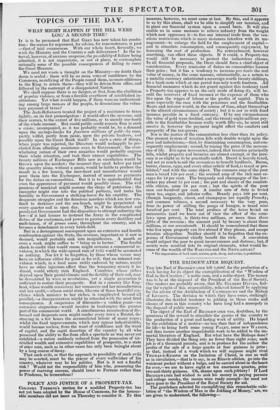TOPICS OF THE DAY.
WHAT MIGHT HAPPEN IF THE BILL WERE LOST A SECOND TIME ?
IT is to be presumed that Earl GREY has now taken his resolu- tion : the season for argument, for advice, for remonstrance, is past —that of trial commences. With our whole heart, fervently, we wish the Ministry and the Country a safe deliverance ! In the in- terval, however, of anxious suspense, the possibility of failure being admitted, it is not unpatriotic, or out of place, to contemplate rationally some of the possible consequences of failing to carry the Great Measure.
We need not waste a thought on the Ministry—no doubt their doom is sealed : there will be no more votes of confidence by the Commons, no rallying of the People round them, no more addresses to the King to retain them—they will be driven from office, and followed by the contempt of a disappointed Nation. We shall suppose there is no danger, at first, from the ebullition of popular violence, or from a forcible overthrow of established. in- stitutions. Yet what would happen, if there were an understand- ing among large masses of the people, to discontinue the volun- tary payment of taxes? The Anti-Reformers treated the project of a resistance to taxes lightly, on its first promulgation : it would affect the revenue, said .their orators, to the extent of five millions, or to merely one-tenth of the whole amount. But could public credit remain firm in such a crisis • accompanied, as it too probably would be, by a demand upon the savings-banks for fourteen millions of gold—by runs, partly, wilful, partly from panic, upon the private bankers, and possibly upon the Great Bank itself? In such a state of things, when paper was rejected, the Directors would unhappily be pre- cluded from affording assistance even to Government ; the over- whelming nature of their own anxieties would probably engross their whole attention, and task their utmost capabilities. The twenty millions of Exchequer Bills now in circulation would be thrown upon the market ; the moment they sunk below par (and the quantity alone, without a panic, would be liable to produce the result in a few hours), the merchant and manufacturer would pour them into the Exchequer, instead of money as payments for the duties on commodities. But it is to be apprehended that even the appearance of payment would possibly cease. The evil passions of mankind might assume the shape of patriotism ; the smuggler might rise into the political partisan, and make his hostility to Government a stalking-horse for his cupidity. The desperate struggles and the ferocious murders which are now con- fined to darkness and the sea-beach, might be perpetrated in every quarter and in open day. That is, if the distracted and paralyzed Government had the disposition to attempt enforcing the law—if it had leisure to instruct the Army in the complicated duties of the exciseman, and power to garrison every distillery and malt-house et id genus omne, throughout the country, and to bivouac a detachment in every brick-field. But in a derangement consequent upon an extensive and hostile combination against the State, the revenue, important as it now is deemed, would probably sink into insignificance. A month or even a week might suffice to " bring us to barter." The fearful shock to credit that would ensue might occasion a commercial re- vulsion, to which the wide-spread ruin of 1825 would be accounted as nothing. Nor let it be forgotten, by those whose voices may have an influence either for good or for evil, that an internal con- vulsion which, in a land more richly endowed by nature, might have no other injurious effect than the temporary misery it in- duced, would utterly ruin England. Countries whose riches depend upon Their genial climate and the fertility of their soil, may be devastated by wars or revolutions, yet a single generation is sufficient to restore their prosperity. But in a country like Eng- land, whose wealth consists in her commerce and her manufactures and her credit,—whose social state, like one of those beautiful ma- chines which minister to her riches, is complicated. beyond all parallel,—a disorganization might be attended with the most fatal consequences. A suspension of discounts—a sudden panic—an extensive stagnation—would involve in bankruptcy the greater part of the commercial world. A simultaneous insurrection of dis- tressed and desperate men might render every town a Bristol, de- stroying in a few hours the accumulated labour of many years ; whilst the fixed improvements, which may appear indestructible, would become useless, from the want of confidence and the want of capital, and the rapid desertion of the country by all who possessed the ability to flee from such a spectacle as was never yet exhibited—a nation suddenly reduced from the possession of un- rivalled wealth and extensive capabilities of prosperity, to a state of utter ruin, such as in-other cases has only been brought about by a long course of decay. That such evils, or that the approach to possibility of such evil's may be averted, must be the prayer of every wellwisher of his country, whatever may be his politics. But is it not a fearful risk? Would not the responsibility of him who, possessing the power of insuring success, should trust to Fortune rather than to Prudence, be tremendous?



























 Previous page
Previous page